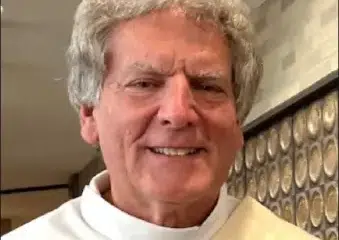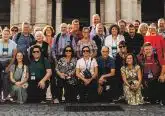Why the Church Must Be a Perpetual Pilgrim

The National Eucharistic Pilgrimage is an encouraging milestone in the midst of the three-year National Eucharistic Revival. Roughly forming a cross between the four corners of the U.S., the processions witness to Christ’s life-changing presence in the world. Pilgrims from the four routes will converge in Indianapolis on July 16 to be greeted by tens of thousands of Catholics waiting to welcome Christ in their midst.
Along with witnessing to Christ’s presence in the Eucharist, the National Eucharistic Pilgrimage is a timely reminder that the Church Herself is on perpetual pilgrimage. It represents the fundamental tension between the Church and the world in which She uneasily resides. The Church as a pilgrim is not merely a description of the Church, but its mandate.
To understand my point, consider some common synonyms for “pilgrim.” These include stranger, wayfarer, alien, wanderer, visitor, traveler, outsider and itinerant. While not equivalent to one another, these words capture varied aspects of what it means to be a pilgrim, who by definition, is never at home. Rather, he is passing through a land that is not his own. This implies that he is on his way toward some destination, but always restless on the way.
Of course, the obverse is that when a pilgrim ceases to be a stranger, he also ceases to be a pilgrim. Then, one of two contradictory things happened: Either the pilgrim successfully completed the journey to his proper destination or he abandoned his quest and compromised his identity as a pilgrim to the culture that made him an alien. Obviously, the Church has not accomplished the former; thus, it must be ever vigilant against committing the latter.
According to the Gospel of Luke, the Holy Spirit revealed to a “righteous” and “devout” man named Simeon that the Messiah would be born before he died. When he encountered Mother and Child, Simeon blessed them and said to St. Mary that “this child is destined … to be a sign that will be contradicted.” The word “contradict” is a compound of two Latin words that mean to “speak against.” Thus, in speaking for or against Christ, “the thoughts of many hearts will be revealed” (Lk. 2:34-35). In other words, Jesus is the test or the standard by which members of the City of God and of the Earthly City (to use the terms of famous pilgrim St. Augustine) will be identified.
Taking up Simeon’s theme later in St. Luke’s Gospel, Jesus asked, “Do you think I have come to establish peace on the earth?” Answering His own question, He declared, “No, I tell you, but rather division. From now on a household of five will be divided, three against two and two against three” (Lk. 12:51-52). Jesus is not indicating that He wills division, but rather that to follow Him on the pilgrim’s way necessarily implies contradiction with the foreign land through which His disciples trudge.
This is not to say that we Catholics should seek conflict or deliberately make ourselves contemptible to the surrounding culture. If our witness is consistent and steadfast, we don’t have to try. Following Christ on the pilgrim’s path is itself a sign of contempt to a world that rejects Him. Those of the world will inevitably “speak against” us. On the other hand, when we actively avoid conflict through compromise, it does not take long for compromise to become assimilation.
Readers of this column know that one of my favorite texts in the Christian tradition is the “Epistle to Diognetus,” a late first- or early second-century apologetic letter. Its anonymous author explains that we Christians can live anywhere but are at home nowhere. “They dwell in their own countries, but simply as sojourners,” says the author. “As citizens, they share in all things with others, and yet endure all things as if foreigners. Every foreign land is to them as their native country, and every land of their birth as a land of strangers.” It speaks to why we are not called to resolve the tension, but rather to be a witness to it.
In a 1976 Lenten retreat, later published as the book A Sign of Contradiction, Pope St. John Paul II explained that Simeon’s words “sum up most felicitously the whole truth about Jesus Christ, his mission and his Church.” The Eucharistic Pilgrimage is an abiding sign that while Christians maintain the integrity of our witness, the world will always speak against us. When it stops, that will be a sign of assimilation. God forbid that we allow that to happen.
 Dr. Kenneth Craycraft holds the James J. Gardner Chair of Moral Theology at Mount St. Mary’s Seminary & School of Theology. He is the author of Citizens Yet Strangers: Living Authentically Catholic in a Divided America (OSV 2024).
Dr. Kenneth Craycraft holds the James J. Gardner Chair of Moral Theology at Mount St. Mary’s Seminary & School of Theology. He is the author of Citizens Yet Strangers: Living Authentically Catholic in a Divided America (OSV 2024).
This article appeared in the July 2024 edition of The Catholic Telegraph Magazine. For your complimentary subscription, click here.













